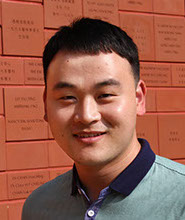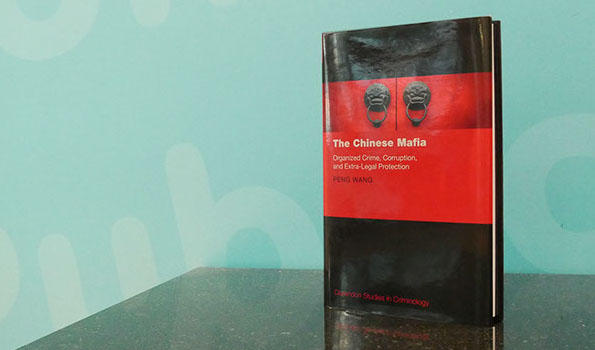_01.png?crc=4174553115)
Cover Story
Research
People
Books
Archive
Download PDF
Download PDF
E-book version
Teaching
and Learning
Knowledge
Exchange
Such has been the speed of China’s expansion over that past 40 years that the circumstances which leave room for criminal gangs to grow – namely, times of social upheaval and weak law enforcement creating a power vacuum – have been ripe, enabling organised crime in China to evolve from street gangs to criminal syndications.
Dr Wang’s book The Chinese Mafia – Organized Crime, Corruption, and Extra-Legal Protection looks at that evolution and reveals how the focus of these syndications has changed from traditional illegal activities such as gambling, organised prostitution and drug trafficking to specialising in selling extra-legal protection.
“It’s a rapidly expanding business – with two prominent syndications existing side by side – the Black Mafia which are street gangs, and the Red Mafia, comprising corrupt government officials,” said Dr Wang. “A key issue examined in the book is the hierarchical relationship which exists between the Red Mafia and the Black Mafia, both of which have different functions to criminal gangs in other parts of the world.
“In Sicily, for instance, the mafia can wield its power to influence elections,” he said. “In China there is no universal suffrage so this aspect does not exist. But the corrupt officials of the Red Mafia safeguard criminal gangs who seek out their protection, while the Black Mafia do their dirty work such as collecting debts and evicting people from their homes so the developers can move in.”
A more unusual arm of this style of illegal services is the widespread practice by Chinese hospitals of hiring extra-legal Black Mafia organisations to deal with disturbances instigated by patients or their family members. By the same token though, if the Black Mafia do not create a strong relationship with the real police force, then the police will swiftly crackdown on them.
Another unique aspect of the Chinese mafia is the role of guanxi – networking or social capital – in its operations. Dr Wang said: “Guanxi can be more important than the law – it represents your status, your face and your reputation, and you depend on it for reciprocity in gaining inside information, protection or even a coveted position in government. It is a mechanism used by private company executives and government officials alike to facilitate the building up of networks. To the mafia’s advantage, it also allows for information to be kept within a network.”
He pointed out too though that networking is an integral part of the culture of China and it has its positive side. Indeed, it was his own guanxi that gave Dr Wang the connections to gather the empirical evidence he needed to write the book. As an undergraduate, he attended the Shanghai-based criminal justice college from 2005 to 2009, where he built a network of colleagues who are now policemen, prosecutors and judges and who helped him contact the right people to speak to reap information.
A kind word and a gun
One of his most important discoveries was the emergence of what he terms ‘soft violence’ – which, while not the exclusive modus operandi of Chinese mafias, certainly seems to be employed often and most efficiently in China. American gangster Al Capone famously once said: “You can get much further with a kind word and a gun than you can with a kind word alone,” but Dr Wang suggests that China’s mafias are taking a different approach, with the introduction of verbal violence as opposed to physical.
“Gangs use ‘soft violence’ to create psychological stress,” he said. “They stalk, harass and humiliate people, threatening them so they live in fear but not actually doing them physical harm. It is very effective. The police will not tolerate actual violence, because their power as law enforcement officials must be seen to prevail – particularly since President Xi Jinping introduced his anti-crime campaigns to ensure the Party State looks strong. Hence, gangsters have turned to soft violence to intimidate, so it appears they are adhering to the anti-crime drive without actually doing so.”
In addition to covering the mafia in today’s China, the book provides historical perspective, with brief histories of criminal organisations such as Shanghai’s infamous Green Gang, which rose to great power in the 1920s and 1930s when they helped Chiang Kai-shek by acting as low-level enforcers enabling him to gain control of the big banks. Chiang was in fact a member of the gang for a while, but the relationship deteriorated after the defeat of Japan in 1945. Indeed Green Gang leader Du Yuesheng is quoted as saying: “Chiang Kai-shek treats me as a urinal device: he only comes to me when he is in need, otherwise he puts me under the bed.”
Having completed the book, the focus of Dr Wang’s current research is on the recent crackdowns on the mafia in China. “When organised crime is perceived by the public to be a serious problem, then police have to do something,” he said. “Anti-corruption campaigns have been a hot topic in China for four to five years. The Central Commission for Discipline Inspection (CCDI), which is the highest internal control institution of the Party, is tasked with enforcing internal rules and combating corruption within the Party. The campaigns are a challenge for China’s legal system, but the Party cares about the success not about the procedure, and the aim of the campaigns is to show the Party still has the power to solve crises.” How the mafias, both Black and Red, deal with this remains to be seen.
The Chinese Mafia – Organized Crime, Corruption, and Extra-Legal Protection was published by Oxford University Press in 2017.

Gangsta Wrap
Sicily has its Cosa Nostra, Japan has the yakuza, Russia has gangsters and Hong Kong triads. But until now there has been little focus on criminal syndications in modern Mainland China. A new book by Dr Wang Peng, Assistant Professor of Criminology, fills that void.

![]() Guanxi can be more important than the law – it represents your status, your face and your reputation, and you depend on it for reciprocity in gaining inside information, protection or even a coveted position in government.
Guanxi can be more important than the law – it represents your status, your face and your reputation, and you depend on it for reciprocity in gaining inside information, protection or even a coveted position in government. ![]()
Dr Wang Peng
Back

_12.png?crc=11173089)